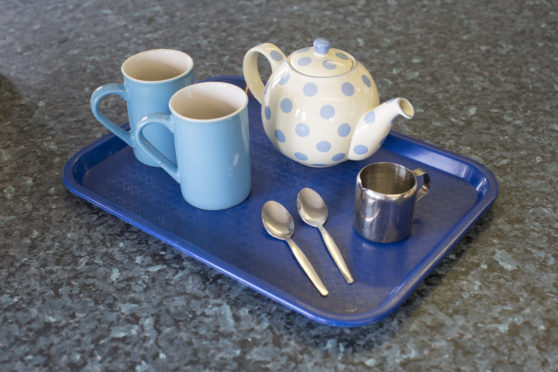I am a busy person. All of my days are busy. I have so much to do that my time is full to bursting.
Every day I juggle responsibilities at home with those at my work. I have to make time to be at my desk in the office, out in Aberdeenshire or the northern islands visiting churches, as well as time with family and friends, walking the dog, doing the gardening, cleaning the house and so on.
I like lists. Mine are very long. I consider it a good day when I can complete a number of things on my list: tick, tick, tick. I am productive, I can do two things at once and at the same time think about a third. A multi-tasking woman, that’s what I am.
All of this means that time seems very precious. I try to make the most of it. And I get frustrated and cross if something or someone slows me down. When every minute has to count, choosing the wrong queue in the supermarket, or being held up because of some unforeseen mishap can be frustrating. When this happens I get impatient, I look at my watch, and I start to feel a little angry inside.
I am not alone. So many of us today are driven to a very high level of activity. We are cramming all that we can into life, not always leaving enough spare. All the signs are that this is not good for us, that we are driving ourselves too hard. What is the answer? Well I think I have found it! The answer is to go slow.
The other day I was walking briskly down Union Street, and someone called out who wanted to speak with me. We walked down the street together. The other person was older than me, and more infirm, so they were walking slowly. I had to reduce my speed to accompany them. By walking slowly together we were able to have a conversation. I had to slow down to listen. Sometimes we have to slow down to make sure others are included. And it can be from these others that we can learn so much.
Sometimes I meet people who want to chat, over a cup of tea say. Not everyone has lots to say, and some people struggle to put into words what is on their mind. Sometimes it is enough just to sit together, and through the time it takes to drink a cuppa maybe only a couple of sentences will be said. This is a slow conversation, but none the worse for this. Better a little said carefully, than lots of words that don’t mean very much.
There was a time when we all did less, and did more things slowly. Certainly in times past, people walked more, and as they walked there was time to look and notice what was happening around them. And there might have been more time to stop and stare and do not much at all. This lack of productivity was good, allowing people time to pay attention to themselves and to others, to be restored at the very heart of their person.
The Christian tradition helps me with this in a couple of ways. I am reminded that Jesus went about on foot. His slow journeys around Galilee enabled him to meet people, have long conversations, and to pay attention to what was really going on for others. There is no story in the Bible where Jesus is in a rush.
The second thing my faith helps me with is to take time for a Sabbath. I work every Sunday, so I have to take other time to rest and recuperate. I have to carve out Sabbath time during my week when I do very little. I am increasingly loving this time. Stopping to do nothing much reminds me that not everything depends on me, I am not essential. Resting teaches me my place – life can go on without me.
As we are in the summer, we can make the most of the longer, lighter days, and make time to do nothing. As we take a break from the workplace we can slow right down, and do less. We can also choose to do ordinary things slowly – a slow drink, a slow walk, a slow read, a slow conversation. As we slow down we can appreciate life so much more. As we slow down we make less mistakes, and many of the things we give our time to can go so much better, because we are more present than we might usually be.
A slow summer, this would be of great benefit to us all.
The Rt Rev Anne Dyer is Episcopalian Bishop of Aberdeen and Orkney and Scotland’s first female bishop

